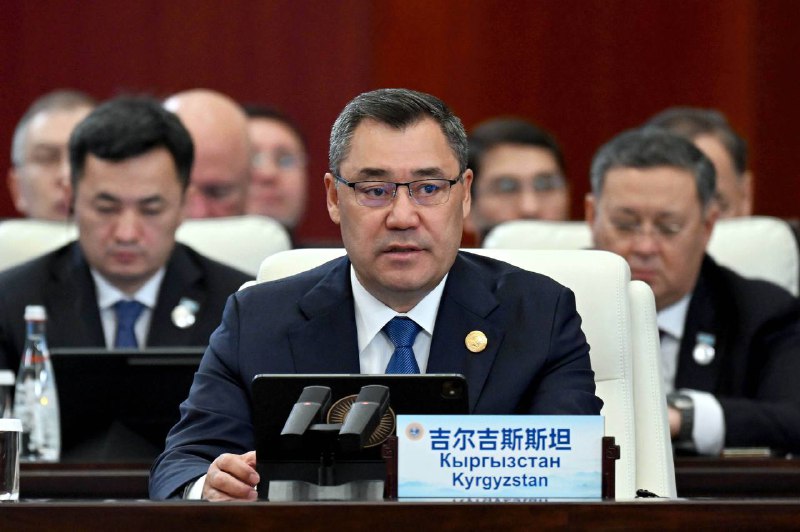BAKU, Azerbaijan, September 1. Kyrgyzstan’s chairmanship of the Shanghai Cooperation Organization (SCO) in 2025-2026 marks an important milestone for both the country and the organization as a whole. Kyrgyzstan, being one of the SCO’s founding members, now has the chance to step up and show how a small state can make a mark on international processes by putting forward practical solutions that lead to real benefits for the region. The country’s involvement with the SCO dates back to the “Shanghai Five” in 1996. This group later evolved into a full-fledged organization, and today Kyrgyzstan leverages this experience to unite the interests of different members and promote new projects within the SCO.
This marks Kyrgyzstan’s fourth time stepping up to chair the SCO. Previously, the country held the chair in 2006-2007, 2012-2013, and 2018-2019. The motto for the 2025–2026 chairmanship, “25 Years of the SCO: Together Towards Sustainable Peace, Development, and Prosperity,” reflects Bishkek’s pragmatic approach.
The primary emphasis is on fortifying security protocols:
addressing terrorism, extremism, and separatism, alongside
initiatives to inaugurate a center in Bishkek aimed at countering
transnational organized crime syndicates. This hub will facilitate
collaborative engagement among member states to synergistically
address threats and disseminate specialized knowledge. Particular
emphasis is placed on the facilitation of harmonious conflict
resolution: the ratified accord with Tajikistan regarding the
demarcation of the state boundary and the trilateral pact with
Uzbekistan exemplify effective dispute resolution via diplomatic
dialogue and strategic compromise.
Within the economic landscape, Kyrgyzstan is advocating for the
establishment of a financial architecture under the auspices of the
SCO, encompassing a Development Bank, a Development Fund, and an
Investment Fund. Leveraging these instruments will catalyze capital
influx for transportation initiatives, the enhancement of energy
frameworks, and the proliferation of regional transit networks.
Successful implementation of this initiative will provide the country with access to investments for transport projects, the construction of new roads and bridges along regional routes, and the modernization of energy infrastructure. For example, getting the ball rolling on the China-Kyrgyzstan-Uzbekistan railway and widening the transport corridors through Kyrgyzstan will be a significant leap toward knitting together regional economic integration.
Kyrgyzstan is also throwing its hat in the ring by adding fresh elements to the SCO agenda, focusing on digitalization and the green economy. The nation advocates for the establishment of a Youth Digital Forum under the auspices of the SCO, facilitating a platform for emerging professionals to engage in discourse regarding collaborative IT initiatives and digital technology ventures. Furthermore, Kyrgyzstan is embarking on collaborative initiatives focused on ecological preservation and the advancement of sustainable energy solutions, encompassing micro-hydroelectric systems and photovoltaic installations, in accordance with international paradigms and fostering capital influx into green ventures.
When it comes to cultural and humanitarian initiatives, Cholpon-Ata on the shores of Lake Issyk-Kul is set to wear the crown as the “Tourism and Cultural Capital of the SCO.” Strategic initiatives encompass the reactivation of the Issyk-Kul Forum, originally convened in 1986, alongside the orchestration of the World Nomad Games, a competitive platform where international athletes will engage in traditional sporting disciplines. These initiatives facilitate the enhancement of diplomatic relations among sovereign states and serve to exhibit the distinctive cultural patrimony of Kyrgyzstan.
Kyrgyzstan’s turn at the SCO helm presents a golden opportunity to spread its wings on the global stage and show a hands-on knack for tackling regional hurdles. Effectively operationalizing these initiatives will enable Bishkek to enhance its geopolitical clout within Central Asia while concurrently establishing the nation as a credible intermediary in navigating intricate security and economic collaboration challenges. Initiating the Center for Countering Transnational Organized Crime, optimizing transport corridors, enhancing energy infrastructure, and advancing digitalization alongside the green economy create unprecedented opportunities for capital influx and collaborative ventures advantageous to all member states.
Moreover, cultural and humanitarian efforts, like the Issyk-Kul Forum and the World Nomad Games, help to tighten the bonds between nations and showcase Kyrgyzstan’s one-of-a-kind cultural legacy on the world stage. Collectively, these strategic measures establish a framework for sustainable regional advancement, adaptive capacity, and economic vitality, exemplifying how a minor jurisdiction can adeptly shape the priorities of prominent global entities via practical approaches, proactive engagement, and accountability to its collaborators.







